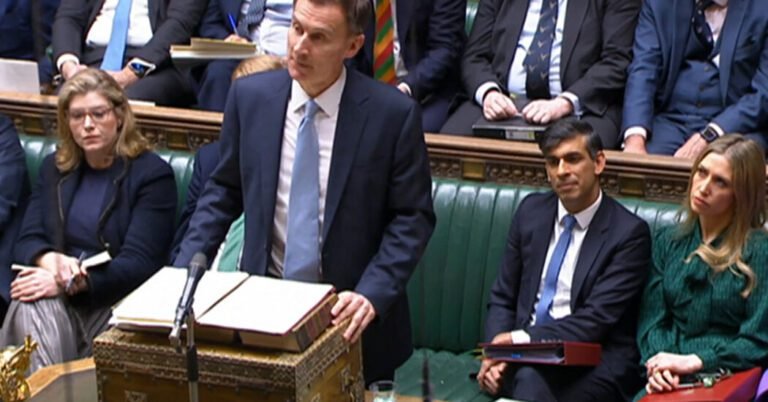Amid a bleak outlook for economic growth, the British government has announced it will cut taxes for workers ahead of this year’s general election.
Jeremy Hunt, Britain’s top economic official, told lawmakers on Wednesday he would cut National Insurance, a payroll tax paid by workers and employers that funds state pensions and some benefits, by two percentage points. It will reduce the rate for about 27 million employees to 8 percent and follows a two-percentage-point cut announced less than four months ago. Together, the cuts would save the average worker about 900 pounds ($1,145) a year, Mr. Hunt said. The rate also fell for the self-employed.
“We can now help families not just with temporary cost of living support, but with permanent tax cuts,” Mr Hunt, the Chancellor of the Exchequer, told Parliament. “We do this to give help in difficult times. But also because the Conservatives know that lower taxes mean higher growth.”
Mr Hunt also announced a sweep of smaller measures, including a freeze on alcohol and fuel taxes, proposals to boost productivity in the public sector and scrap tax benefits for foreign earnings of British residents living abroad.
The chancellor is under political pressure from the ruling Conservative Party to cut taxes ahead of a general election expected this year, although no date has yet been set. The party is trailing the opposition Labor Party significantly in the polls.
But Mr Hunt’s ability to sweeten voters has been limited by the fact that Britain’s economy is growing slowly — if at all. Expanded public services need money and there are calls for more investment in infrastructure. The chancellor must also adhere to self-imposed fiscal rules, which have given him even less fiscal room for manoeuvre.
By cutting some taxes, the Conservative Party hopes to change the narrative that the end of their 14-year rule was dominated by tax increases. However, due to freezes on income taxes and other measures, the tax burden, measured by tax revenue as a percentage of gross domestic product, is set to rise to its highest level since World War II. The income tax cut, a more broad-based tax, was reportedly ruled out due to concerns about the cost of such an offer and the risk of rising inflation.
But there is a sense among economists and other analysts that this budget will hamper the next government – possibly led by Labor if the polls confirm – by delivering tax cuts today and leaving less money available for many government departments after the election.
The Conservative Party is fighting for its electoral future in an unforgiving economic landscape. Although inflation has eased from double-digit highs to 4%, the Bank of England is wary of cutting interest rates any time soon. Meanwhile, businesses are failing at a rapid clip and voters say they want measures to help reduce the high cost of living.
The British economy closed last year in recession. This year, it is expected to rise 0.8 percent and then 1.9 percent in 2025, according to the Office for Budget Responsibility, an independent fiscal watchdog.
“Because we have turned the corner on inflation, we will soon turn to growth,” Mr Hunt said.
Budgets across Europe are under pressure as economies feel the pressure of higher interest rates and the need to spend more on defense and invest more aggressively in the green transition. At the same time, officials are trying to reduce debt levels after spending heavily throughout the pandemic and support households through an energy crisis after Russia’s invasion of Ukraine shut down a key source of natural gas. Last month, the French government announced 10 billion euros ($10.9 billion) in spending cuts.
On Wednesday, Mr Hunt said he would keep everyday spending growth at 1 per cent, adjusted for inflation, over the next five years. And instead of increasing those budgets more, the money would be “better spent,” he said, citing proposals to use technology, including artificial intelligence, to increase productivity in health, policing and the courts.
The British government has previously said it will keep defense spending steady as a share of national income. Mr Hunt outlined a big increase in childcare funding, money for the National Health Service and a commitment to keep spending on schools stable after adjusting for inflation. This leaves other government departments such as courts, prisons and local government facing potentially steep cuts. High inflation has also eroded the strength of previous spending plans.
This puts the next government in a tight spot. To keep the tax cuts and maintain pre-existing spending commitments, the next government will have to allow these other spending cuts to go ahead, despite voters calling for more investment in public services. Or, the next government will need to raise taxes, something none of the main parties want to propose before the election.
But perspective can change. If the economy grows stronger or productivity increases, public finances could become more favorable. To promote this, Mr Hunt stressed that his plans, including cuts to National Insurance, would encourage people to return to work. There are 700,000 more people reported as economically inactive than before the pandemic.
Some of the tax cuts will be funded by a change in the tax treatment of overseas income for so-called non-residents, people whose permanent residence is outside Britain. It would raise £2.7bn a year until 2029, Mr Hunt said.
The change poses a challenge to Labour, which had planned to withdraw the ‘non-residential’ status in order to raise money to fund some of its election promises such as NHS staff recruitment and an expanded school breakfast service .
The non-house rule change raises “money that the opposing party was planning to use for spending increases,” Mr. Hunt said. “But today a Conservative government is making a different choice. We’re using that revenue to help lower taxes on working families.”

